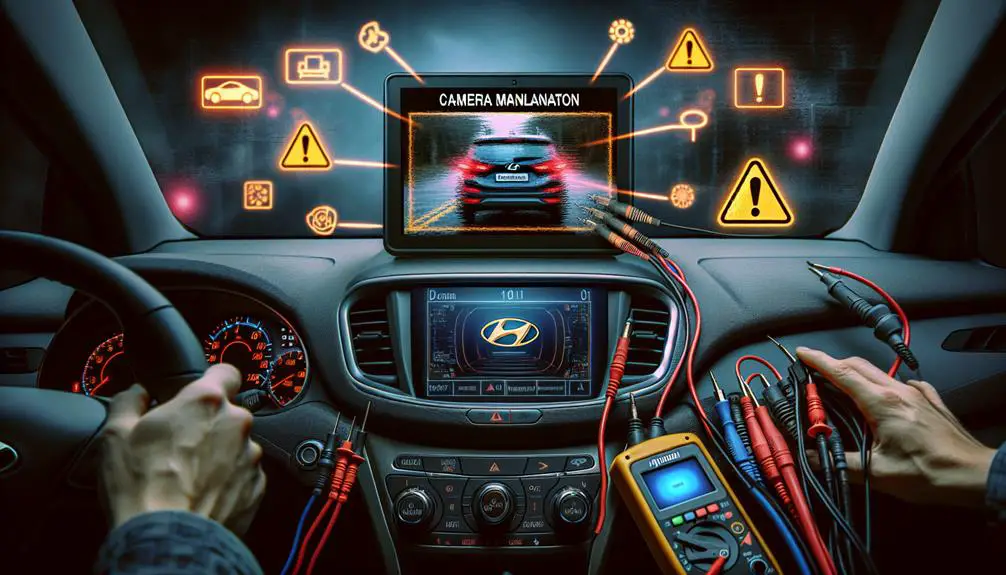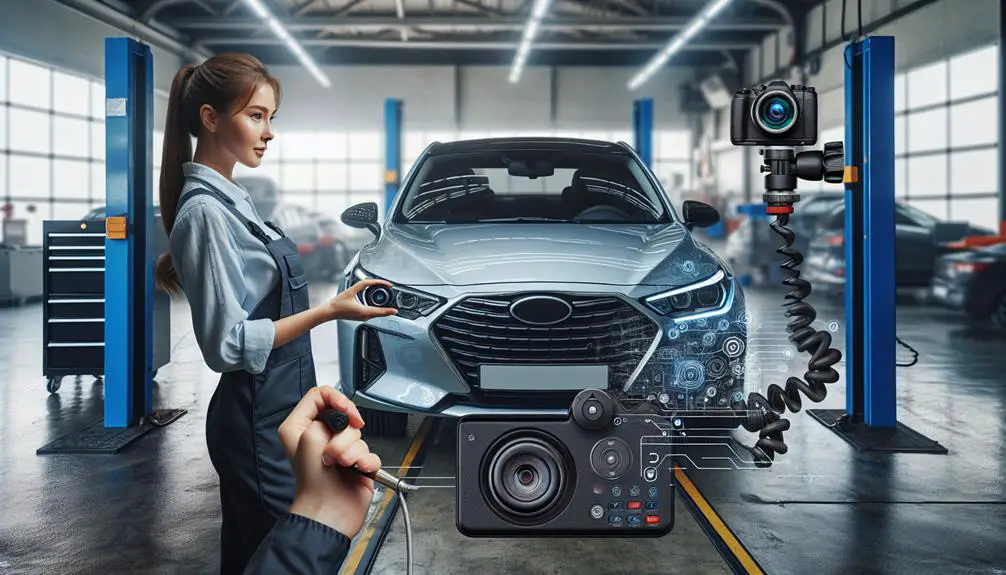Some common issues with Hyundai backup cameras include a blurry or distorted image, a black screen, or a camera that fails to display anything.
Quick fixes may involve restarting the vehicle, checking for any obstructions on the camera lens, or adjusting the camera settings through the touchscreen display.
Regular cleaning routines can help maintain optimal camera performance. Use a soft cloth to clean the lens and remove any dirt, dust, or grime that may be affecting the camera's clarity.
Checking the electrical connections is crucial to ensuring that the camera is receiving power and functioning properly. Inspect the wiring and connectors to identify any loose connections or damage that may be causing the issue.
Identifying Common Symptoms

When your Hyundai's backup camera stops working, you'll likely notice the screen going blank or displaying a distorted image. This is the initial sign that something's amiss, and it's important not to ignore it. Other symptoms can include the camera freezing during use or showing a completely black or blue screen instead of the live feed from behind your vehicle. These issues can range from being minor annoyances to important safety concerns, especially when you're reversing in tight spots or trying to navigate through crowded parking lots.
You might encounter intermittent functionality, where the camera works perfectly one moment and fails the next. This sporadic behavior can be particularly frustrating because it doesn't provide a clear indication of the underlying problem. Additionally, you may notice that the camera's view is no longer aligned correctly, showing you more of the sky or the ground than is useful for backing up safely. Such misalignment could be because of physical adjustments or software glitches.
Another common symptom is poor image quality, where the feed appears grainy, overly dark, or too bright. While this might seem like a minor issue, it hampers your ability to see obstacles or hazards behind your vehicle clearly.
Identifying these signs early on is important for maintaining your safety and the functionality of your Hyundai's backup camera system. Each sign points to different potential issues, from simple fixes to more complex electrical problems, and recognizing them promptly can save you time and frustration down the line.
Quick Troubleshooting Tips
Before delving into costly repairs, let's investigate some quick troubleshooting tips that you can perform yourself to possibly fix your Hyundai's backup camera issues.
To start off, you'll want to check if the backup camera function is enabled in your vehicle's settings. It may sound simple, but it's easy to overlook. Plunge into your car's infotainment system, and make sure the backup camera option is turned on. If it's off, simply toggle it back on and see if that resolves the issue.
Next, give the fuse box a once-over. A blown fuse can be the culprit behind your backup camera woes. Locate your Hyundai's fuse box, usually found under the dashboard or in the engine compartment. Refer to your owner's manual to find the specific fuse linked to the backup camera. If it's blown, replacing it with a new one of the same amperage might just do the trick.
Don't forget to check the camera's wiring and connections. Loose or damaged wires can disrupt the camera's function. You'll need to access the area around the backup camera—this might involve removing some interior panels. Once you're there, make sure all connections are secure and there's no visible damage to the wires. If you spot any issues, a simple reconnection or a bit of electrical tape for minor damages could be all you need.
Implementing these quick fixes can save you time and money. If you're still facing issues after trying these tips, it might be time to seek professional help. But often, a little DIY can go a long way in solving your backup camera problems.
Cleaning and Maintenance

After trying the quick fixes, it's equally necessary to regularly clean and maintain your Hyundai's backup camera for peak performance. Keeping your backup camera in top condition not only guarantees better visibility but also prolongs the lifespan of the device. Here are some tips to help you keep your camera functioning at its best:
- Wipe the camera lens gently: Use a soft, clean cloth to wipe the lens. If there's stubborn dirt or grime, slightly dampen the cloth with water or a lens cleaner. Avoid using harsh chemicals that could damage the lens.
- Check for debris and obstructions: Make sure there's nothing blocking the camera's view, like mud, snow, or leaves. Regularly inspect the area around the camera and clear any obstructions.
- Inspect the camera housing: Look for any signs of cracks or damage that could allow water or dirt to enter, compromising the camera's functionality. If you find any damage, it's best to have it repaired as soon as possible.
- Ensure the connection is secure: While this doesn't involve direct cleaning, making sure the camera's connection to your Hyundai is secure can prevent many issues. Loose connections can cause intermittent or no video feed.
- Schedule regular professional check-ups: Even with diligent maintenance, having a professional inspect your backup camera system can identify issues you might overlook. They can also perform more complex maintenance tasks to guarantee everything is working correctly.
Electrical Issues and Solutions
While maintaining your Hyundai backup camera is crucial, addressing electrical issues can resolve many common problems affecting its performance. Often, these issues stem from loose or corroded wiring connections that disrupt the camera's power supply or signal. Here's how you can tackle these problems yourself.
Initially, check the fuse associated with your backup camera. If it's blown, replacing it might get your camera back in action. You'll find the fuse in your Hyundai's fuse box; consult your owner's manual to locate the correct one. If the new fuse blows soon after, you likely have a more significant electrical problem requiring further investigation.
Next, inspect the wiring and connections to the camera. You're looking for any signs of wear, corrosion, or looseness. Electrical contact cleaner can help restore connections affected by corrosion. For loose wires, make sure they're securely reattached. If you're not comfortable doing this, a quick guide or tutorial specific to your Hyundai model can provide step-by-step instructions.
If you've checked the fuse and wiring but the issue persists, the problem might lie within the camera itself or its power supply. A multimeter can help you verify if power is reaching the camera. Set it to measure voltage and check the power wire to the camera. If there's no voltage, the issue could be with the wiring harness or a more complex electrical problem in your vehicle.
Professional Repair Options

If you've tried troubleshooting your Hyundai's backup camera without success, it's time to contemplate seeking professional repair services. Dealing with advanced automotive electronics can be challenging, and sometimes, the expertise of a seasoned technician is your best bet to restore functionality and guarantee safety.
Here's what you should consider when opting for professional repair:
- Authorized Hyundai Dealerships: They've technicians specifically trained to handle Hyundai vehicles. You'll benefit from specialized knowledge and potentially warranty-covered repairs if your car is still under warranty.
- Certified Auto Repair Shops: Look for shops certified by automotive bodies. These certifications indicate that the mechanics have met specific training standards and are proficient in dealing with modern vehicle technologies.
- Cost Estimates: Before agreeing to any repair, ask for a detailed cost estimate. This should include both parts and labor. Transparency at this stage can help you avoid any unpleasant surprises.
- Warranty on Repairs: Inquire about a warranty on the repair work. A reputable service provider will back their work with a guarantee, offering you peace of mind.
- Turnaround Time: Ask how long the repair will take. You'll need to arrange for alternative transportation if your vehicle is going to be in the shop for a few days.
Choosing the right professional to repair your Hyundai's backup camera can make all the difference. They'll not only diagnose the issue with accuracy but also ensure that the repair is durable. Plus, you'll drive away with the confidence that comes from knowing your vehicle is both safe and fully functional.
Conclusion
In wrapping up, if your Hyundai's backup camera isn't working, you've now got a toolkit to tackle the problem. Start with simple fixes like cleaning and checking for loose connections.
If these don't work, diving deeper into electrical troubleshooting might be necessary. Remember, there's no shame in seeking professional help if the issue persists.
Keeping your backup camera in top shape not only guarantees your safety but also keeps your Hyundai running smoothly. Stay safe and happy driving!
